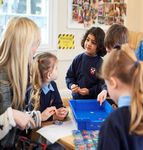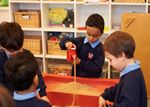Parents Guide to Early Years at Grimsdell September 2021
←
→
Page content transcription
If your browser does not render page correctly, please read the page content below
Introduction
Welcome to the Early Years Foundation Stage (EYFS). This is how the Government and early
years’ professionals describe the time in your child’s life between birth and age 5.
What does our setting look like?
Our Nursery: Reception RAB:
Reception REJ: Reception RHD
Early Years Playground: The Cabin:
Page 1How my child will be learning?
Your child will be learning skills, acquiring new knowledge and demonstrating their
understanding through 7 areas of learning and development.
Children should mostly develop the 3 prime areas first. These are:
• Communication and language;
• Physical development; and
• Personal, social and emotional development.
These prime areas are those most essential for your child’s healthy development and future
learning.
As children grow, the prime areas will help them to develop skills in 4 specific areas. These are:
• Literacy;
• Mathematics;
• Understanding the world; and
• Expressive arts and design.
These 7 areas are used to plan your child’s learning. The professionals teaching and supporting
your child will make sure that the activities are suited to your child’s unique needs.
Children in the EYFS learn by playing and exploring. Being active, being creative and critical
thinking take place both indoors and outside. Teachers plan from the children’s interests to
ensure a full coverage of the above areas of learning.
Page 2What does a typical day look like?
Nursery AM
Nursery starts at 8.15am
Children are collected at 11.45am
Nursery PM
Nursery starts at 12.30pm
Children are collected at 3.15pm
Phonics COOL Play and Number Story Home
Time Snack work
Reception
School starts at 8.15am
Children are collected at 3.00pm
Phonics Cool Play and Number Cool Lunch Outdoor Story Home
Time Snack Work Time Learning
COOL Time = Choose Our Own Learning.
Page 3How can I help at home?
All the fun activities that you do with your Ideas for helping with mathematics:
child at home are important in supporting their • Talk about shapes you see in and around
learning and development, and have a really the house.
long lasting effect on your child’s learning as
they progress through school. Here are just a • Compare weights when picking things
few ideas of things you and your child might up and model the language heavier/
enjoy. lighter.
• Point out numbers you see in the local
Ideas for developing gross and fine motor environment.
control: • Play board games that involve moving
• Give children time to run, jump, climb and a certain amount of steps on, and play
PLAY OUTDOORS! with dice and dominoes.
• Encourage children in building, drawing • Sing counting rhymes.
and threading beads.
• Handle real coins and play shop.
• Let children explore water and sand, filling
and emptying containers and introduce
Ideas for helping with language and
language such as full and empty.
literacy:
• Work on puzzles together. • Sing songs and nursery rhymes.
• Painting, finger painting and making big • Read regularly to your child and share
patterns on differently shaped paper - books together, let your child choose the
talking about the patterns they have made. books, talk about the books and find a
• Painting with water on a wall or a fence. great place to snuggle up.
• Encourage children to strengthen their • Allow your child to see you reading for
fingers by using clay, play dough or pleasure or writing for a purpose such as
Plasticine for modelling. making shopping lists or writing birthday
• Playing and sorting using tweezers to pick cards.
up sequins, buttons or small beads.
• Sprinkling coloured sand, glitter or salt to Ideas for helping with Understanding of
make pictures. the World:
• Plant seeds or bulbs in a pot or garden
patch.
Ideas for helping socially:
• Encourage your child to use the toilet • Cook / bake together.
independently, wash their hands and get • Use the weather – shadows, rain
dressed themselves especially fastening puddles, snow, wind, mist and sun – to
their coats. extend your child’s vocabulary.
• Play games that encourage sharing and • Explore the park at a different time of the
taking turns, help your child to lose! year – go off the beaten track.
Page 4How can I find out how my
child is getting on?
It is important that we work together. You
need to feel comfortable about exchanging
information and discussing things that will
benefit your child.
• Weekly open house sessions allow parents
to visit the classroom with their child and to
look at the environment and the work they
have produced.
• Tapestry online learning journal provides
parents with real time access to
observations teachers have taken in class.
• When your child is 5 (At the end of the
EYFS) – in the summer term of the reception
year in school, teachers complete an
assessment which is known as the EYFS
Profile. This assessment is carried out by
the reception teacher and is based on what
they, and other staff caring for your child,
have observed over a period of time. This
will come home to you in the form of a
written report and opportunities are given
for you to come in and discuss this with the
class teacher. An additional written report
is sent home in the Autumn term.
• In the Autumn and Spring term, you will
be invited to discuss your child’s progress.
A summary of their development will
be discussed with you and how you can
support their learning at home.
• Throughout your time at Grimsdell, a link
to our website and weekly newsletter will
be emailed to you. This is our main form of
communication about activities in class and
whole school events and information.
Your child’s records are available for you to
view throughout the school year.
Page 5Where can I go for further
information?
You can find the Early Years Foundation Stage which includes the early learning goals at
foundationyears.org.uk. The foundation year’s website also includes a range of resources
and contacts.
Page 6Instilling values, inspiring minds
millhill.org.uk/Grimsdell
Grimsdell
Mill Hill Pre-Preparatory School
Winterstoke House
Wills Grove
Mill Hill
London NW7 1QR
020 8959 6884
millhill.org.uk
Follow us
@MillHillPrePrep
Page 7You can also read



























































